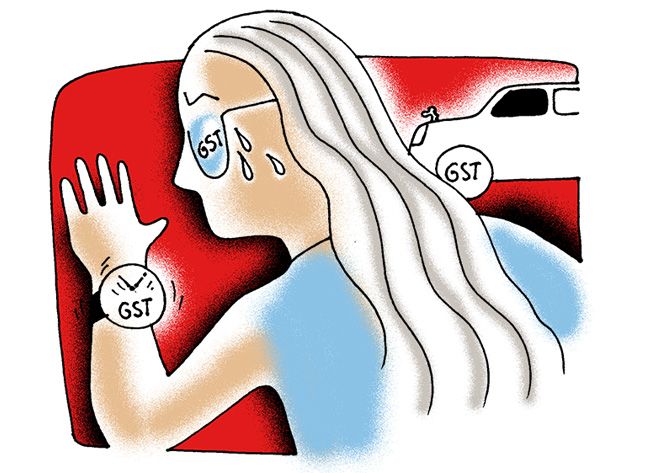Will it benefit you?
Or will it lead to an increase in inflation?
Bipin Sapra believes it will be some time before GST's benefits reach consumers.
Illustration: Dominic Xavier/Rediff.com

After years of wait, GST has finally seen the light of day on July 1, 2017.
GST has been introduced with great fanfare including the hour-long midnight event in Parliament.
Unlike any tax reform in the past, GST has caught the attention of people from all walks of life -- businessmen, professionals and consumers alike.
One question that besieges every assessee is how to price the final supplies, both goods and services, in the GST regime.
Overall, one of the key rationale for introduction of the GST was that it will remove cascading of tax and thereby reduce the price at which goods and services are supplied to final consumers.
However, as the legislative process has evolved, GST is seeing multiple rates depending on the classification of goods and services.
The underlying principle behind this is that the government has sought to equalise the GST rate with the current aggregate rate of indirect taxes -- service tax, VAT, excise duty, luxury tax, etc that the respective good or service currently attracts.
Now with this principle being the underlying one, the expectation of significant reduction in prices of goods under the GST regime may not come true.
The impact on pricing of each good or service will differ depending on their embedded indirect taxes and the alignment of the output GST rate vis-a-vis the current indirect tax rate structure.
Further, the impact may vary from one state to another since the VAT rates on the same products may have been different across states.
But to cull out a general theme, the pricing of most goods is expected to be come down slightly, primarily due to unlocking of the inbuilt indirect taxes in their cost base.
On the other hand, the pricing of most services is expected to increase due to the general 3 per cent rate in the GST rate from the current 15 per cent service tax to the 18 per cent GST which will be levied.
Some category of services like telecom may see a slightly lesser increase, again due to the fact that the industry may see elimination in cascading of taxes.
For a taxpayer, the criterion for pricing this supply would be rate of input and output supplies, the additional credit benefit percolating down to the assessee and any other cost or efficiency impacting the final price.
While the market will take care of the final price, there may be cases where due to various reasons it may take some time before the prices come down.
Further, the government has also included anti-profiteering provisions in the GST law.
The government intends not to use it in a routine manner, but more as a deterrent for those businesses who did not intend to pass on the benefit of a more liberal credit regime by way of reduction of prices.
The industry seems to be generally wary of the extent and manner of use of these provisions by the government, which may result in the passage of the benefits to the consumers.
In a number of cases, the pricing of these products is governed by the contracts which may not change immediately.
These contracts are also bound by the Contract Act and may not be open to change in the immediate future.
As industries try to understand the overall impact of GST on their supplies, it may actually take sometime before the actual impact of FST may be felt by the common man.
Bipin Sapra is Tax Partner, EY India. The views expressed are personal.










